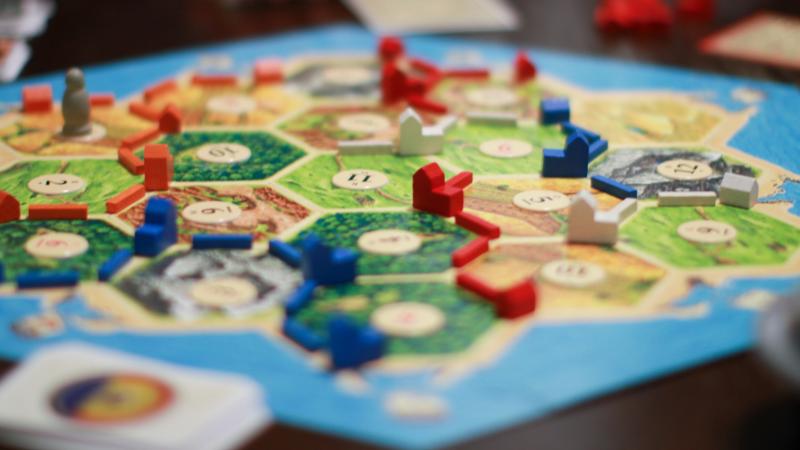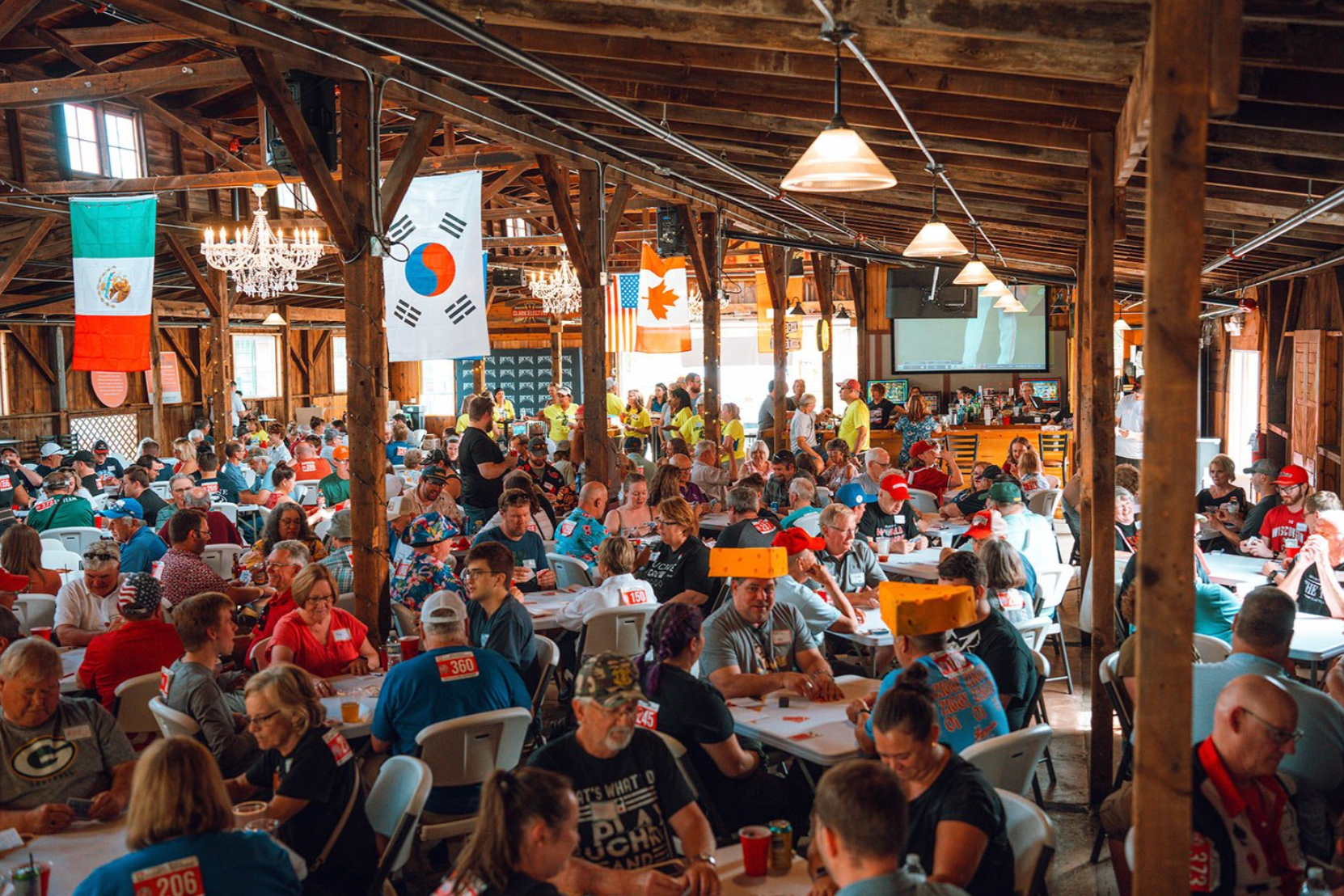The best board games motivate players by giving them a fictional role to play out — a real estate tycoon trying to dominate the market, an elite team of scientists and doctors fighting a global disease outbreak or a fledgling New World colony in need of resources.
That last game — Settlers of Catan — really made board game critic Eric Thurm realize that beneath the surface of players trading with one another for portions of stone and wheat, the game designer had created something much larger. That took the form of embellishing weekly games with roommates with a backstory read from the game’s historical novel, according to Thurm.
“It creates the environment in which you are most willing to be swept along with the game,” he said to Anne Strainchamps for “To The Best Of Our Knowledge.”
Stay informed on the latest news
Sign up for WPR’s email newsletter.
But over time, Thurm said he recognized the player experience as what game designers call “the magic circle” — a space where the rules of reality are suspended and a game asks us to participate in its fiction via our particular role in the games’ story.
“When you’re ‘in the magic circle,’ everyone is agreeing to the rules of the game,” said Thurm. “We’re not literally buying and selling properties, but everyone has just sort of decided to suspend disbelief and engage with each other.”
As Thurm thought about this “magic circle” more deeply, he came to realize it’s a space that game creators can use to communicate ideas, even training players to think in ways aligned with the rules of the game. He writes about it in his book, “Board Games” — and over a few games played in studio, he explained to Anne how the power of games can be used for good or for ill.
This transcript has been edited for clarity and length.
Anne Strainchamps: You start your book with this idea that board games communicate ideas. How did you begin to think like that about board games?
Eric Thurm: I think the first place that I thought about it was when I learned about this Nazi propaganda game, Juden Raus. I stumbled upon this Wikipedia page called “Nazi Board Games,” and I vaguely remember yelling to whoever was in my house at the time that they needed to come read this thing over my shoulder. It just never occurred to me that could exist.
AS: Juden Raus. “Jews, Get Out.”
ET: Yeah. Essentially, the way that it works is you are in a city that is not named, but is ostensibly Berlin. And you go around and find these spaces on the board that are marked as shops or houses or places where Jewish families live. And then you take these pieces that look like hats — that in the original version have these very anti-Semitic caricatures painted on them. You pick them up and then you go back to your collection point, drop off the family and then they are ostensibly … are going get deported to Palestine.
AS: So you’re going around as a player — imagine this little Aryan kid — going around basically plucking up Jews.
ET: Yes. And for that, they get points. The winner is the first person (to get to six).
There are two copies of (the game) in the world, one of which is at Yad Vashem and the other one is at the Wiener Holocaust Library in London. I asked them to send me a scan of the board, and had it printed at a print shop near my house. Then, I had a friend of mine who speaks German translate the rules.
AS: So you actually wanted to play it?
ET: I did play it. I had a bunch of my Jewish friends come over (for) Shabbat dinner and then play this game. That was the whole point — we were going to talk about it and have this conversation — What does it feel like to play this now? Does it raise any questions for us?
The mechanic is really similar to any other standard board game that you would play. The thing that’s different is just that the board looks different, and the thing it’s telling you to do is a little bit different.
AS: But fundamentally, it’s not that different than, say, Candyland.
ET: Right, exactly. I spent a lot of time thinking about that. Especially when you’re a child, you just will interact with whatever is put in front of you. You just will play because it’s what you have available.You don’t really think about the story that’s telling you.
The conversation that we ended up having was really interesting because you start playing it and it feels terrible. And then — because all you’re really doing is rolling and moving your pieces — within 10-15 minutes, you just forget that you’re going around and picking up Jewish families.
My friends said, “I don’t think this would have been very successful as propaganda because it’s a bad game.” And other people said it was scarier in some ways that the game makes the act of rounding up these families boring and sort of banal, something that you would do over the course of an evening’s family entertainment.
(It’s) a pretty standard board game that was capitalizing on something that was trendy at the time. But the thing that happened to be really trendy was anti-Semitism.
AS: So this is a really good introduction to thinking about games as a form of propaganda. That’s a really overt example, but you write quite a bit about how games train us to think from inside their rules.
ET: Especially in basic competitive games, the point of the game is to win, and you get trained to do what the game expects you to do in order to win.
So let’s say you’re talking about Monopoly. The point of Monopoly is to get the most money. If you play a lot of Monopoly, the best way to play the game is to be really ruthless — to take other people’s properties, to do a lot of really aggressive trading, to undermine people, to be really vicious.
AS: That’s why I hate that game.
ET: Well, that’s why a lot of people hate that game. And it’s a reason why I like co-operative game so much. So I talk a little bit, in the book, about this game The Grizzled.
It’s a cooperative game about World War I. Every character in the game is a member of this unit. And you don’t win battles — you just are surviving. There is snow and hail and gas attacks and all these terrible things. And the point of the game is really just that you and the other players are sharing the burden of existing.
The way that you successfully complete rounds is by retreating and by stopping the mission, which you do by putting down a token that says “I want to lend support to one of the other players.” And at the end of every round, when everyone has withdrawn, you look and see who has gotten the most support. And that person gets a very, very small bonus from the game.
AS: This is like an anti-war game. I mean, if you think about it, compared to, I don’t know, Axis and Allies. The goal isn’t to win. The goal is to survive.
ET: I think it does a really fantastic job of taking the thing that it’s about and making it the rules of the game. The point of the game and the way that you play it is by thinking about the theme: can friendship be stronger than war? And the answer is often no, because it’s very hard.
(Another example: the game Class Struggle.) It was marketed as the world’s first socialist board game. It was created and published in 1978 by Bertell Ollman, who at the time was (and still is) a political science professor at New York University. He encountered the early history of Monopoly and thought: Why isn’t there a game that teaches people about why either monopolies are bad, or about what it would look like to really engage in this kind of struggle?
AS: I like this — it says “Class Struggle: To prepare for Life in Capitalist America” with a picture of Karl Marx arm wrestling with Norman Rockefeller.
ET: So there’s a die here that has all the classes on it. And the way that you start playing is by rolling the class die and simulating the genetic lottery, because you don’t get to decide what class you’re born into.
I think that a lot of (the game) is pretty accurate, and is still pretty accurate in a lot of ways. And (it’s) also just very funny (while) communicating a lot of ideas that are often treated as very stuffy, because it’s all done through jokes.
AS: I think what you’re saying is we should have “game literacy” in the same way that we have media literacy. If you’re going to play a game, spend some time thinking about what it’s actually teaching you.
ET:I think it’s complicated. I think if you think that the game having an idea or a message is inherently nefarious, then it becomes very depressing, which it is in some ways.
But also that you can just say: OK, what kinds of games do we want to be playing? There definitely are games that have ideas that I think are good. And the fact that a game is propaganda or has ideas isn’t a reason to not play it.





